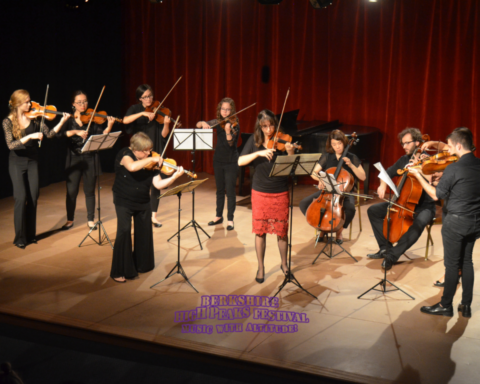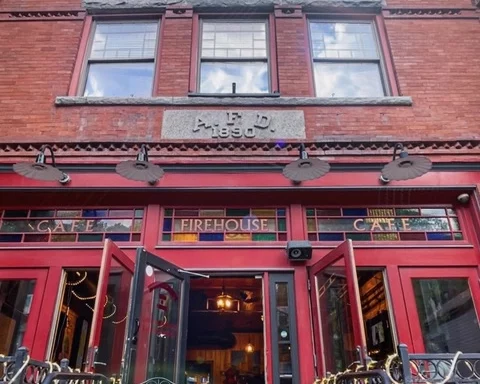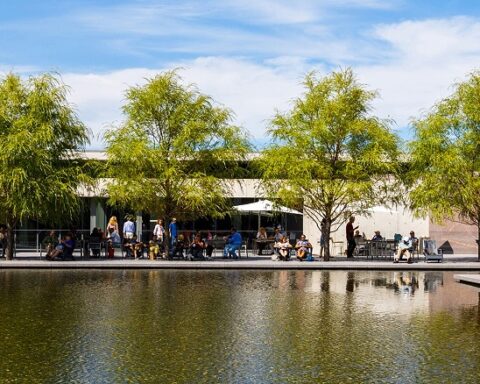Podcast (will-call): Play in new window | Download
Subscribe: RSS
(Cover Photo) From left: Luke Haskell, Dara Silverman, Madeleine Rose Maggio; photo By Eloy Garcia.
Lenox, Mass. — Shakespeare & Company presents William Shakespeare’s comedy Love’s Labor’s Lost, directed by Kelly Galvin and performed outside in The Dell at The Mount, Edith Wharton’s Home. This family-friendly, open-air production featuring Shakespeare & Company Education Artists runs from July 10th – August 18th.
Today is Monday, August 13 and you’re listening to Episode #70 of Will Call.
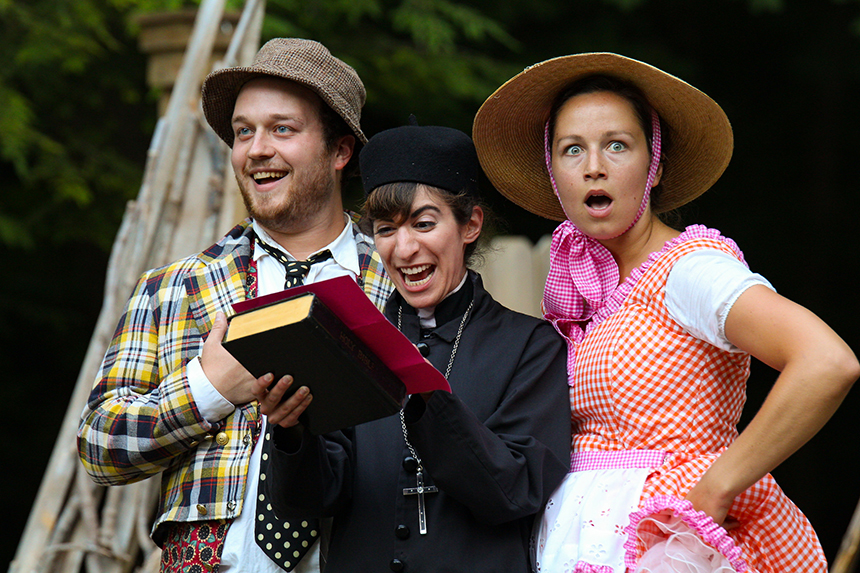
We hear from director Kelly Galvin, who returns to Shake and Co. for her ninth season with the company after earning an MFA from Boston University this Spring. Her experience directing, with Shakespeare & Company, WAM Theatre, Boston Playwrights’ Theatre, Southwest Shakespeare, and other companies really pays off in this faced-paced early Shakespeare comedy from the mid 1590s.
This week’s show takes us to The Mount, Edith Wharton’s Home, in Lenox Massachusetts. Weather permitting, Shakespeare & Company presents William Shakespeare’s Love’s Labour’s Lost under the open sky at The Dell, a sort of natural amphitheater that is a truly ideal place to experience this particular play, which is being performed until August 18. You don’t want to miss this immersive experience, so I’d encourage you to visit the company on the web at shakespeare.org for tickets and more information,
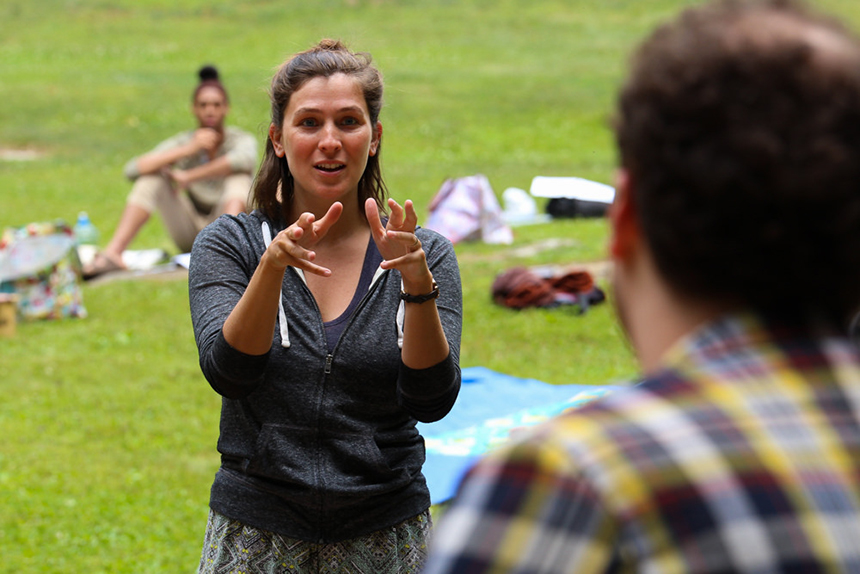
“One of Shakespeare’s very first plays, Love’s Labor’s Lost offers us a glimpse of an audacious young playwright delighting in his virtuosity,” says director Kelly Galvin. “Within his sparkling poetry we sense the young playwright coming into the fullness of his power. In doing so, he conjures a fantastical world of young luminaries who are coming into power in their own right. In The Dell, where the borders between our actors and audiences are most fluid, we find a perfect setting for Shakespeare’s rhapsody of language, laughter, and summer love.”
Also with us are actors Luke Haskell and Madeleine Rose Maggio. Luke brings to life the irreverent knave Costard, while Madeleine portrays both the wanton country wench Jaquenetta as well as the somewhat vacuous nobleman Longaville, a member of the court of Ferdinand, King of Navarre.
Historically one of the less frequently performed of Shakespeare’s works, Love’s Labour’s Lost yet has a solid, if simple, storyline that acts as a perfect vehicle to explore themes familiar to us more than 400 years after the works first publication. Director Kelly Galvin gives us an overview of this prototype of so many literary battles of the sexes to follow:
Love’s Labor’s Lost begins with the King of Navarre dedicating himself and his country to a life of scholarship. The King and his courtiers have made an oath renouncing worldly pleasures and have commanded all the townsfolk of Navarre to do the same. But when the Princess of France and her ladies arrive on a diplomatic visit, the King and his friends find the enticements of summer love more powerful than they had imagined. A spoof of those who try to shun love and life, Love’s Labor’s Lost is full of witty wordplay, outrageous mishaps, and riotous comedy.
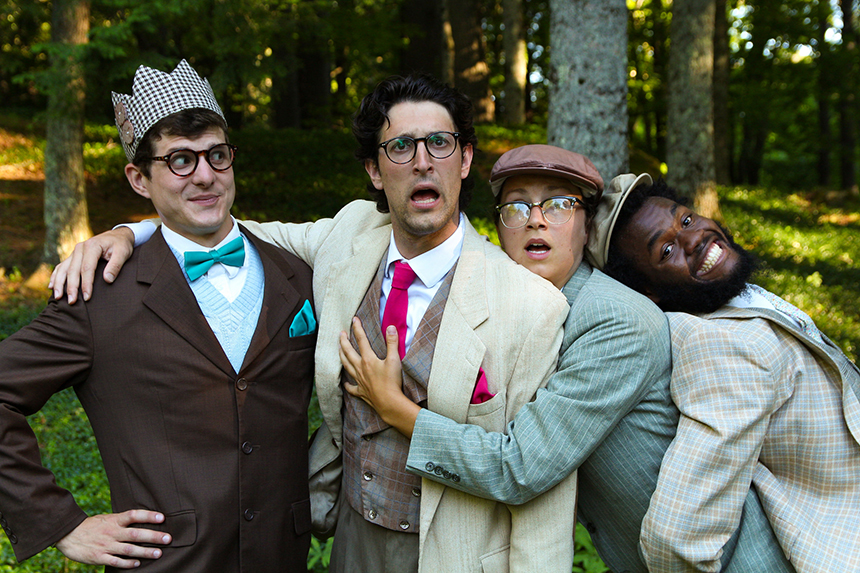
Luke Haskell and Madeleine Maggio are prime examples of how arts organizations like Shakespeare & Company really do drive the economy of the region. Both actors grew up in the Berkshires, got involved with the company in their teens, and have managed to pursue their craft professionally right here at home.
Director Kelly Galvin points out that there’s also something special about the Mount, which was Shakespeare & Company’s first home in the late 1970s. The playwright set a number of his works either partially, or entirely in the open air, such as Love’s Labour’s Lost, and The Dell is a space seemingly engineered by Nature specifically for the benefit of this production.
Actors Haskell and Maggio share Galvin’s appreciation of the space.
Kelly Galvin explained that Love’s Labour’s Lost is masterpiece of language and wit, but that underneath the clever verbal sparring between the sexes, a timelessly tender question of the heart awaits an honest answer.
“I fell in love with Shakespeare as a kid seeing the plays performed, so the opportunity to direct in this space for our widest ranging audience is really special for me,” continued Galvin. “As we create this play, we’re thinking about how the story will resonate for audiences of all ages, and it makes our storytelling more complex, imaginative, and nuanced knowing that we’ll have some audience members who are seeing Shakespeare for the first time, and some who already have a deep relationship with the playwright.”
Haskell notes that the important characteristic of these exchanges is their overall comic lightness.
Haskell’s character, Costard, is more than happy to engage in conversational duels with both men and women, however noble or common they may be. One gets the sense that his lack of education and refinement doesn’t blunt the edge of his own locutionary prowess.
Another comedic figure, who might at first blush seem to have a disproportionate influence on the events of Love’s Labour’s in relation to her spoken presence is Jaquenetta. Galvin explains this curiously pivotal character, played by Maggio, who also breathes life into one of the king’s courtiers, Longaville.
Maggio seems really to relish portraying this character, who manages to capture the heart of the larger than life visiting Spaniard, Don Armado, played by Thomas Reynolds.
Despite his passionate avowal to join Ferdinand’s abstinence campaign, and his equally passionate rejection of the prolonged purification, it was not Don Armado who first took up the pledge and was the first to break under the weight of a lady’s charms. Longaville, played by Maggio, is something of a loveable lunkhead, whose personification presented the actor with an opportunity to plumb the depths of masculinity from a unique perspective.
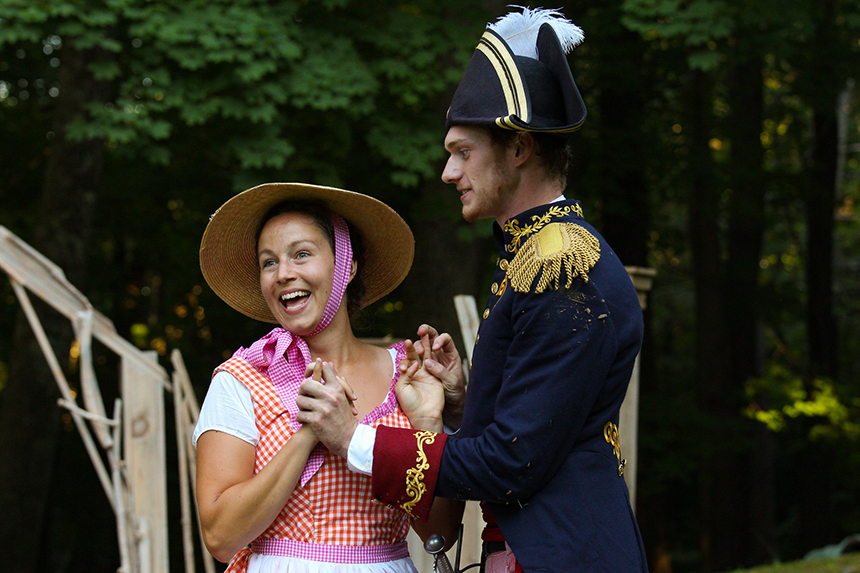
Beyond the fact that Love’s Labour’s Lost is over four centuries old, I think we can be forgiven any spoilers of which we’re guilty in this episode, based on the events of Act I, Scene I. Four young men, swearing off the company of the fairer sex, is bound to come crashing down ‘ere long in the company of the French princess and her entourage. It’s only natural.
From Luke’s perspective, part of Shakespeare’s intent is encourage people to embrace a measure of surrender.
For Maggio, the women in the play, and perhaps especially Jaquentta, don’t need to fight their femininity the way the men try first to squelch their masculinity, and then overcome the barriers imposed by norms of behavior.
We shouldn’t be surprised that Shakespeare promoted the notion that feminine common sense is an inborn guiding instinct—many of the women who populate his works possess impressive strength of intellect and character, though not always simultaneously. Maggio says that she had a revelation about the men of the Kingdom of Navarre upon delving into Longaville—there may be a message from the 16th Century men of today would do well to absorb.
So, no, Billy Shakes doesn’t treat us to a rollicking wedding banquet at the end of Love’s Labour’s Lost. No gods and goddesses kissing and making up. No mistaken identities resolving into renewed appreciation of commitment. You could say the shadows have offended and little’s been fixed when the play has ended.
But Shakespeare doesn’t let us leave Navarre without a song in our hearts, though a pensive, melancholy song it may be. In a way, leaving the ending of the play slightly unresolved gives composer Deborah Morris the perfect opportunity to inject just the right sentiment into a production that invites us ponder as much as to laugh.
Well that’s it for episode 70 of Will Call, here at the Greylock Glass. I’ve been your host, writer, editor, audio engineer, site administrator, and chief bottle washer. If you enjoyed this program, let me know. Shoot me an e-mail through our Contact page or directly to [email protected] It’s always good to hear from you. And you’ll hear from us again soon, so stay tuned. For now stay safe, be good to each other, and go easy on yourself.
Kelly Galvin returns to Shakespeare & Company for her ninth season having just received her MFA in directing from Boston University. The cast features David Bertoldi, Caroline Calkins, Emily Eldridge-Ingram, Lori Evans, Rory Hammond, Luke Haskell, Fiona Herter (Education Intern), Caitlin Kraft, Madeleine Rose Maggio, Rylan Morsbach, Devante Owens (Riotous Youth Intern), Bella Pelz (Riotous Youth Intern), Thomas Reynolds (Riotous Youth Intern), and Dara Silverman. The creative team includes Devon Drohan (Set Design), Elizabeth Magas (Costume Design), Deborah Morris (Composer), and Cindy Wade (Stage Manager).
Tickets for Love’s Labor’s Lost are available online at shakespeare.org, or by calling Shakespeare & Company’s box office at (413) 637-3353. The show is family-friendly, general admission, and tickets are $25 for adults and $10 for youth. Performances will run approximately 90 minutes with no intermission, and will be followed by short talk-back with the actors. The Mount is located at 2 Plunkett Street in Lenox, Massachusetts. The grounds open 90 minutes before each performance. Audience members are encouraged to bring chairs or blankets and a picnic; chairs are also available to rent for a fee of $2 per chair.
AT A GLANCE
PRODUCTION: Love’s Labor’s Lost
PLAYWRIGHT: William Shakespeare
DIRECTOR: Kelly Galvin
SET DESIGNER: Devon Drohan
COSTUME DESIGNER: Elizabeth Magas
COMPOSER: Deborah Morris
VOCAL COACH: Gwendolyn Schwinke
STAGE MANAGER: Cindy Wade
CAST MEMBERS
BEROWNE: David Bertoldi
ROSALINE: Caroline Calkins
MARIA / DULL: Emily Eldridge-Ingram
HOLOFERNES: Lori Evans
PRINCESS OF FRANCE: Rory Hammond
COSTARD: Luke Haskell
FORESTER: Fiona Herter
BOYET: Caitlin Kraft
LONGAVILLE / JAQUENETTA: Madeleine Rose Maggio
KING OF NAVARRE: Rylan Morsbach
DUMAINE: Devante Owens
MOTH: Bella Pelz
DON ARMADO: Thomas Reynolds
KATHARINE / SIR NATHANIEL: Dara Silverman
SCHEDULE
JULY
Tuesday, July 10 – 6:00 PM (preview)
Thursday, July 12 – 6:00 PM (opening)
Saturday, July 14 – 11:00 AM
Tuesday, July 17 – 6:00 PM
Thursday, July 19 – 6:00 PM
Saturday, July 21 – 11:00 AM
Tuesday, July 24 – 6:00 PM
Thursday, July 26 – 6:00 PM
Saturday, July 28 – 11:00 AM
Tuesday, July 31 – 6:00 PM
AUGUST
Thursday, August 2 – 6:00 PM
Saturday, August 4 – 11:00 AM
Tuesday, August 7 – 6:00 PM
Saturday, August 11 – 11:00 AM
Saturday, August 18 – 11:00 AM (closing)
About Kelly Galvin
(Director, Love’s Labor’s Lost) ninth season. S&Co Director: The Clean House (reading), Fall Festival of Shakespeare 2008-2013, Bankside Preludes. S&Co Actor: A Midsummer Night’s Dream, King Lear, The Venetian Twins, The Winter’s Tale, The Learned Ladies, Les Liaisons Dangereuses. WAM Theatre: Artistic Associate (2012-2014), The Last Wifedirector, Blue Stockings (reading) director, Fresh Takes inaugural curator and producer. Other Directing: Southwest Shakespeare (Photograph 51), Boston Playwrights’ Theatre (Memorial, New Play Festival), The Theatre at Woodshill (As You Like It, Much Ado About Nothing), Boston University School of Theatre (The Cherry Orchard, The Caucasian Chalk Circle, Dancing at Lughnasa, The Duchess of Malfi, The Tall Girls). Assistant Directing & Observerships: Asolo Rep, Bedlam NYC, Orlando Shakespeare Theatre, Boston Center for American Performance, Huntington Theatre Company. Directing Fellowship: Asolo Repertory Theatre. Artistic Development Internship: Arena Stage. Training: MFA, Boston University. BA, Wellesley College. kellydirecting.com.
About William Shakespeare
(Playwright, Love’s Labor’s Lost) He was an English poet, playwright, and actor, widely regarded as the greatest writer in the English language and the world’s pre-eminent dramatist. His works, including some collaborations, consist of about 37 plays, 154 sonnets, two long narrative poems, and several other poems. His plays have been translated into every major living language and are performed more often than those of any other playwright.
About Shakespeare & Company
Located in the beautiful Berkshires of Western Massachusetts, Shakespeare & Company is one of the leading Shakespeare festivals of the world. Founded in 1978, the organization attracts over 30,000 patrons annually. The Company is also home to an internationally renowned Center for Actor Training and award-winning Education Program. More information is available at www.shakespeare.org.






